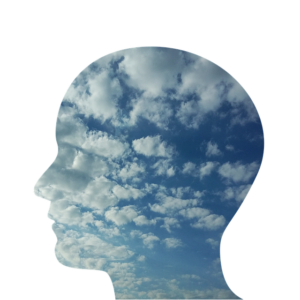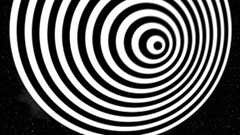 It’s no secret that I’m slightly obsessed with the brain. Okay, okay, it’s a full-blown obsession, but it’s such a fascinating organ!
It’s no secret that I’m slightly obsessed with the brain. Okay, okay, it’s a full-blown obsession, but it’s such a fascinating organ!
The other day, I watched a neuroscience documentary (like I often do). One episode asked the question: Who is in control of what you do? The neuroscientist then said…
“Every action you take, every decision you make, every belief you hold is driven by parts of your brain that you have no access to. We call this hidden world the unconscious, and it runs much more of your life than you would ever imagine.”
Shocking, right? The entire episode blew my mind (no pun intended) and drove me down a rabbit hole of research. What I discovered shows just how many superpowers we writers possess.
Let’s dig in…
The conscious you, or conscious awareness, makes up the smallest part of your brain. The conscious brain believes it’s in full control of the body, when nothing could be farther from the truth.
Have you ever driven home and not remembered how you got there? One minute, a thought crosses your mind. And the next thing you know, you’re turning on to your street. It’s a wild feeling that we write off with, “I’ve driven this route so many times, the car knows its way.” But the truth is, this sensation occurs because the action is being done unconsciously and automatically. And somehow, you arrive home without harm.
Through clinical trials, Freud discovered that beneath the surface of each of us lies a swirling sea of hidden motivations, drives, and desires. The way we think and feel and act is profoundly influenced by our unconscious mind.
As the twentieth century progressed, many others dove into the brave new world of neuroscience. They were trying to uncover how much control the unconscious brain really has, but what they soon discovered was far stranger than anyone could have predicted.
In the 1960s, Eckhart Hess ran several experiments. In one, he asked men to look at women’s faces and make snap judgments about them.
- How kind does she look?
- How selfish or unselfish is she?
- How friendly or unfriendly is she?
- How attractive is she?
What the men didn’t know was how Hess manipulated the experiment. In half the photos, the women’s eyes were artificially dilated. Same women but with different sized pupils. Dilated eyes are, among other things, a biological sign of sexual arousal. This manipulation was meant to influence the choices made by the men, but without them being aware of it.
Can you guess the outcome?
The men found the women with dilated eyes more attractive. Here’s the important part. None of the men noticed the dilated pupils in the photographs, nor did any of the men know about the biological sign of sexual readiness. But somehow, their brains knew.
Hess and his team ran deeply evolutionary programs to steer the men toward the right sort of mate (the feminist in me is holding back here; please do the same). The subjects’ brains analyzed and recognized tiny details in the photos and then acted upon them. All of this occurred without a flicker of conscious awareness.
This type of experiment revealed fundamental knowledge about how the brain operates. The job of this organ is to gather information from the world, then steer appropriate behavior. And it makes absolutely no difference whether you (your conscious awareness) are involved. Most of the time, you’re not. Most of the time, you’re not even aware of the decisions being made on your behalf.
Check out these findings:
- If you’re holding a warm cup of coffee, you’ll describe your relationship to your mother as closer than if you’re holding an iced coffee.
- When you’re in a foul-smelling environment, you’ll make harsher moral decisions.
- If you sit next to a bottle of hand sanitizer, it’ll shift your political opinions a little toward the conservative side, because it reminds your brain of outside threats.
Every day we’re influenced in countless ways by the world around us. And most of this flies completely under the radar of our conscious awareness. Though clueless to us, the unconscious brain is continually reacting to the outside world and making decisions on our behalf.
What separates us from zombie-like beings?
Even when we’re on autopilot, if we come across something we weren’t expecting, our conscious mind is called into action to figure out if this new thing is a threat or opportunity. It’s one of the jobs of consciousness—to assess what’s going on and make sense of the situation. When our expectations are violated, our conscious mind is summoned to work out the appropriate reaction.
But reacting is not its only mission. The conscious brain plays a vital role in resolving internal conflict among the brain’s many automatic sub-systems, each working on its own task.
Take, for example, if you’re hungry but you just started a diet to drop a few holiday pounds. This is when the conscious brain needs to rise above the unconscious and make an executive decision on what to do. Consciousness is the arbiter of conflicting motivations in the brain, with a unique vantage point that no other part of the brain has access to. It’s a way for trillions of cells to see themselves as a unified whole.
For writers, our unconscious brain stores our superpowers.
Our unconscious is capable of truly remarkable feats if we stay out of its way. Therein lies the rub. We can train our unconscious to do many skills automatically, and some of them can seem almost superhuman. Through intense practice, we can harness the brain’s ability to run on autopilot to achieve almost anything.
See where I’m goin’ with this? Note the words “through intense practice.” Meaning, the more we practice, the more we hardwire our brains to work on autopilot. And yes, that includes writing. Those who write daily or several times per week have an easier time than writers who step away from the keyboard for weeks or months at a time.
We also enter the zone more often.
When our conscious awareness relinquishes control to our unconscious brain, we enter the flow state—a form of brain activity experienced by different kinds of people, from elite athletes and meditation experts to professional writers and musicians. Many of whom call this state “the zone,” which arrives during total emersion in a task. In flow states, neural circuits run without conscious mind interference. Our perception clears, our unconscious awareness heightens, and feel-good chemicals flood the brain, which allows for intense focus and gratification.
Thanks to neuroscience, a distinct pattern in the brain emerges when we’re in the zone.
When we first enter flow, dopamine increases attention, information flow, and pattern recognition. It’s essentially a skill booster.
Norepinephrine speeds up the heart rate, muscle tension, and respiration. It triggers a glucose response to give us more energy, increase arousal, attention, neural efficiency, and emotional control, thus producing a high.
Endorphins (rooted from the word “endogenous,” meaning naturally internal to the body) relieve pain and induce pleasure. Strangely, these chemicals function like opioids, with 100 times the power of morphine.
Anandamide (stemming from the Sanskrit word for “bliss”) is an endogenous cannabinoid and feels like the psychoactive effect of marijuana. In flow states, anandamide elevates mood, relieves pain, dilates blood vessels, and aids in respiration. It also amplifies lateral thinking—the ability to link ideas together.
At the end of a flow state, serotonin floods the brain with an after-glow effect. This leaves us with a feeling of bliss and only occurs once we exit the zone.
Unlike many ordinary people, writers dip in and out of the zone on a regular basis. Did I just call us extraordinary? You bet I did! We have a pretty cool superpower. Don’tcha think?
Tips to Achieving Flow
- Balance challenge and skill.
If you’ve never written nonfiction, for example, you may find it difficult to enter the zone because your conscious awareness is stressed out. You’re too afraid of making a mistake to enter flow.
If something isn’t challenging enough, you’ll get bored easily. In turn, so will your reader. Not only will adding plenty of conflict improve your plot, but you’ll enter the zone quicker while writing.
- Establish clear goals.
I will write for three hours. I will write at least 1000 words today. I will write two scenes or one chapter. By establishing a daily writing goal, it relieves the pressure of having to finish the entire first draft by a certain date. How you choose to establish those goals is up to you.
- Reduce distraction.
You will never enter the zone if you’re checking for social media notifications or email every ten minutes. When it’s time to write, write. Save play time and the inbox for later.
- Stop multitasking.
Have you ever turned down the radio while searching for a specific house number or highway exit? You’re instinctively helping your brain to concentrate on a visual task. For more on why multitasking is so difficult and why we should avoid it before a writing session, see my 2021 post entitled Can Multitasking Harm the Brain?
- Don’t force it.
Some days, you’ll enter the zone. Other days, you won’t. It’s okay. Don’t worry about it. You’ll still produce words and make progress.
- Enjoy the process.
You won’t enter flow unless you’re enjoying yourself. Simple as that. If you view writing as a chore, it may be time to step away from the WIP for a while. Yes, penning a novel is hard work, but it also should be enjoyable. If it’s not, you may want to ask yourself why you do it.
What were your biggest takeaways from this research? Are you surprised that we live on autopilot most of the time?

